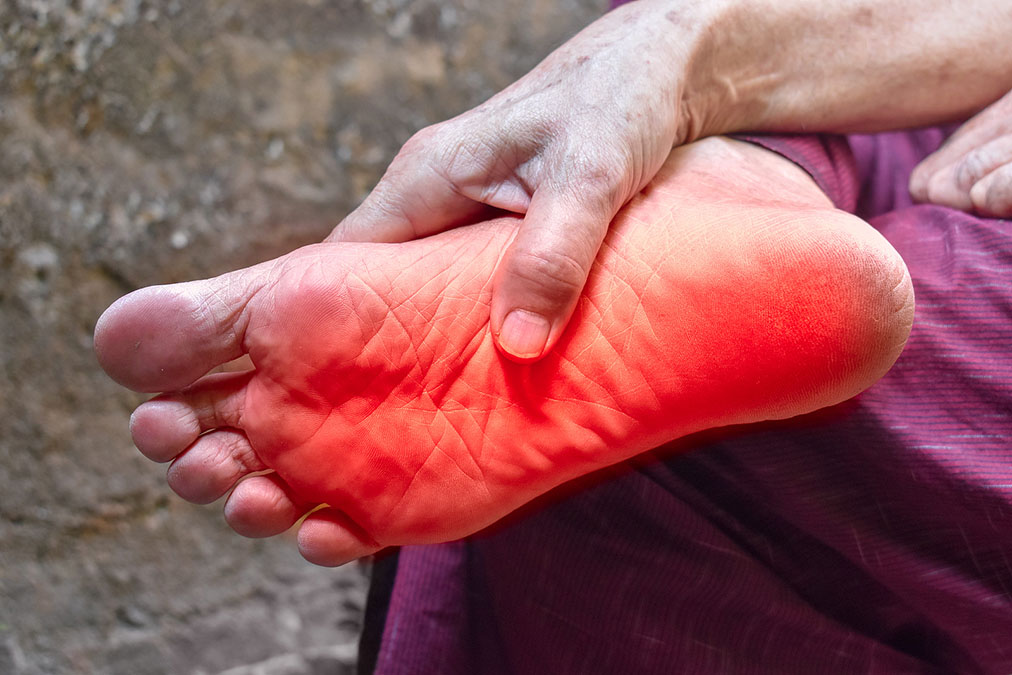 The occurrence of neuropathy has been rising rapidly in recent decades. However, it’s often overlooked as a disease in itself and just considered an annoying consequence of diabetes.
The occurrence of neuropathy has been rising rapidly in recent decades. However, it’s often overlooked as a disease in itself and just considered an annoying consequence of diabetes.
A new study by the American Board of Family Medicine changes this by revealing two major facts:
-
1) The risk of developing neuropathy increases with age, regardless of whether people have type 2 diabetes. For most people, the root cause is never found.
2) It’s a major killer, which can increase your risk of dying by a terrifying 322%.
Patients between the ages of 64 and 102 were enrolled in a large study called the Oklahoma Longitudinal Assessment of Health Outcomes of Mature Adults in central Oklahoma in 1999. The study’s main objective was to identify the prevalence, causes, and effects of neuropathy.
The study has yielded a huge amount of information that the authors of this new study decided to use. They wanted to establish whether elderly people with and without neuropathy lived equally long.
If they didn’t, the researchers wanted to know why not.
They identified neuropathy in patients by checking for sensory loss in both legs through a physical examination. They recorded deaths from the participants’ contacts and online death registers.
With all this information available to them, the scientists made the following discoveries.
-
1. The likelihood of neuropathy increased with age, from 26% for those between 64 and 74 years old to 36% for those between 75 and 84 years old, and 54% for those 85 years old or older.
2. Neuropathy was more likely for those with a body mass index above 30 kg/m2, a history of military service, diabetes, rheumatoid arthritis, poorer self-rated health, slower timed walks, or worse balance scores.
3. From the beginning of the study until their deaths, the average survival time for those with neuropathy was 10.8 years, compared with 13.9 years for those without neuropathy.
4. The likelihood of early death increased by 47% for those with neuropathy.
5. Compared with the youngest age group—those between 64 and 74 years old, the odds of early death increased by 90% for those between 75 and 84 years old and by 322% for those 85 years old or older.
6. There was a link between neuropathy and poor balance.
These results show that in relatively healthy older people, neuropathy is very common and strongly linked to dying earlier. One possible reason might be balance issues, but the researchers didn’t have enough data to know if poor balance led to harmful falls or a general decline in health.
The scientists excluded diabetes as a contributing factor in early death, linking early death mostly to the consequences of neuropathy rather than to its causes.

 Overcoming IBD
Overcoming IBD Multiple Sclerosis
Multiple Sclerosis Banishing Bronchitis
Banishing Bronchitis Gum Disease Gone
Gum Disease Gone Overcoming Onychomycosis
Overcoming Onychomycosis Neuropathy No More
Neuropathy No More The Prostate Protocol
The Prostate Protocol Brain Booster
Brain Booster
 Ironbound
Ironbound
 Solution for Shingles
Solution for Shingles
 The Bone Density Solution
The Bone Density Solution
 The Ultimate Healing Protocol
The Ultimate Healing Protocol
 The Parkinson's Protocol
The Parkinson's Protocol
 The Chronic Kidney Disease Solution
The Chronic Kidney Disease Solution
 Overthrowing Anxiety
Overthrowing Anxiety The Fatty Liver Solution
The Fatty Liver Solution The Hypothyroidism Solution
The Hypothyroidism Solution
 The End of Gout
The End of Gout The Blood Pressure Program
The Blood Pressure Program
 The Oxigized Cholesterol Strategy
The Oxigized Cholesterol Strategy
 Stop Snoring And Sleep Apnea Program
Stop Snoring And Sleep Apnea Program
 The Arthritis Strategy
The Arthritis Strategy The Vertigo & Dizziness Program
The Vertigo & Dizziness Program The 3-Step Diabetes Strategy
The 3-Step Diabetes Strategy Hemorrhoids Healing Protocol
Hemorrhoids Healing Protocol The Erectile Dysfunction Master
The Erectile Dysfunction Master Weight Loss Breeze
Weight Loss Breeze The IBS Program
The IBS Program The Insomnia Program
The Insomnia Program The Migraine and Headache Program
The Migraine and Headache Program The Neck Pain Solution
The Neck Pain Solution The Menopause Solution
The Menopause Solution The Ejaculation Master
The Ejaculation Master The TMJ Solution
The TMJ Solution The Acid Reflux Solution
The Acid Reflux Solution The Fibromyalgia Solution
The Fibromyalgia Solution The Psoriasis Strategy
The Psoriasis Strategy